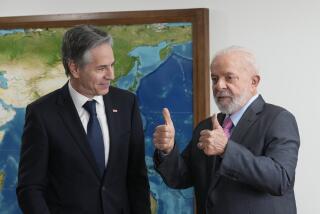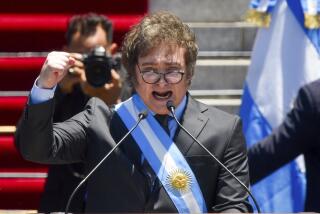Brazil’s Cardoso Says Budget Cut, Higher Taxes Are Necessary
- Share via
BRASILIA, Brazil — President Fernando Henrique Cardoso presented the broad outlines of his long-awaited economic austerity package Tuesday evening, asking the Brazilian people to support a plan that spreads the pain “with an eye toward protecting the poorest.”
Cardoso said he would call on Congress to slash $7.3 billion from the 1999 budget, calling it a cut without precedent.
The former economy minister used a pointer and charts to explain how key reforms to the social security system and civil service that have languished in Congress were necessary to cut a ballooning deficit, though he did not go into detail.
He also talked of raising certain taxes for companies, civil servants and a tax on financial transactions. Finance Minister Pedro Malan is expected to announce the specifics of the package today.
“The definitive solution is not in these measures. What will balance our books is the reforms,” Cardoso said.
The package aims to attack a budget deficit of $65 billion, or 7% of the country’s gross domestic product, and shore up an economy reeling from the fallout from financial problems in Asia and Russia.
The package is seen generally as a prerequisite to any bailout package from the International Monetary Fund and other global lending institutions. The IMF is reportedly preparing a rescue package worth about $30 billion.
Reaction to the austerity plan was mixed.
“The question remains if the cuts expected to result from the tax hikes and spending cuts will be enough to stabilize the relationship between the deficit and the GDP,” said University of Sao Paulo economist Joaquim Eloy de Toledo. “I don’t think so and the president showed he doesn’t think so, either, when he said this was just the beginning.”
Nothing Cardoso said was substantially different from unconfirmed reports circulating in the local media for weeks about what the package would entail.
And they were a far cry from the rumors of devaluation that rocked Brazilian stock exchanges Tuesday afternoon.
The Sao Paulo exchange, the Bovespa, closed off 1.5% for the day after dipping as low as 3.1% before the central bank firmly denied the rumor.
None of the measures is likely to be popular--a major reason Cardoso held off announcing the plan until after Sunday’s runoff elections for governors in 13 states--though some economists think the steps have more chance of passing then they did last year in the run-up to elections.
Despite the delay in revealing the austerity measures, opposition governors won in several key races. Because governors in Brazil often hold greater influence over members of Congress from their states than the president does, Cardoso may still have some difficulty getting his measures through.
But the pressure remains high on Cardoso to follow through on his promises to get Brazil’s economy going again.
“In the past, Brazil got so many waivers [about not meeting established goals] from the IMF that Cardoso really has to shore up confidence in the country or people won’t take it seriously anymore,” said Walder de Gois, president of the Brazilian Institute of Political Studies.
More to Read
Sign up for Essential California
The most important California stories and recommendations in your inbox every morning.
You may occasionally receive promotional content from the Los Angeles Times.













